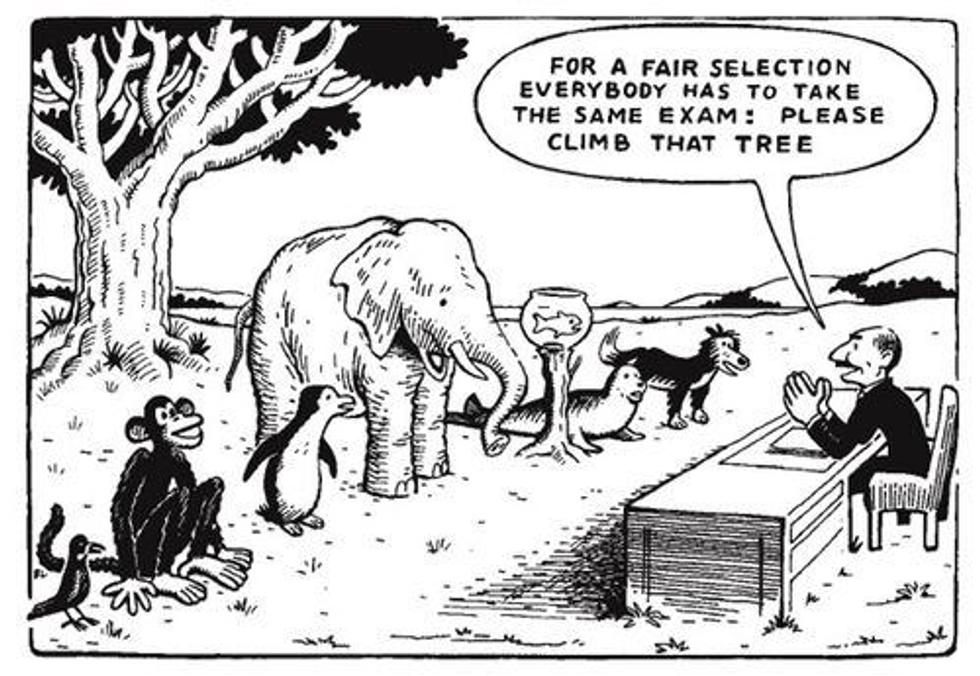I would never call myself an expert in the area of horticulture. Other than watching my grandpa plant some trees and spending a few summers helping my mom in the garden, I don’t know much.
However, I do have some basic knowledge.
I know that different plants, different bushes, and different trees all have different conditions and settings that they need to thrive as a living organism.
Some need to be planted in areas with shade, some with extreme amounts of sunlight. Some plants won’t grow in climates that are too hot or too cold. They all need different amounts of water, differing amounts of space, and different types of soil. Various types of fertilizer and different types of pesticides are used for different plants.
An apple tree cannot thrive in the same conditions that a cactus grows in nor a raspberry bush in the same place as an orange tree.
And here I present to you a metaphor:
So why do we expect different children to all learn and grow in the same setting with the same curriculum?
We pride ourselves with the idea that we acknowledge children’s differences and uniqueness, even celebrate them. But our education system says otherwise.
“Everyone is a genius, but if you judge a fish by its ability to climb a tree, it will go its whole life thinking it’s stupid.”
-Albert Einstein
A lot of children in today’s public school systems are fish being asked to climb trees.
In his Ted Talk, author and educator Ken Robinson state, “Creativity is as important in education as literacy, and we should teach it at the same status” “…We are educating children out of creativity”.
He goes on to say that academic ability that is standardized math and science defines our view of intelligence. “Many highly talented, brilliant, creative people, think they’re not because the things that they are good at wasn’t valued.” Intelligence is diverse, dynamic, and distinct. Children need a way to discover their talents, and we are not adequately providing them with opportunities to do so.
In Pink Floyd's gruesome but symbolic music video for their hit "Another Brick in the Wall," they clearly represent the idea of standardized education and its effect on children.
If we realize that not every plant can grow in the same soil, why do we expect every child to learn in the same setting?
Another point to be made is the lack of adaptation of the school system. The world today is a lot different than it was 100 years ago. Different jobs and opportunities simply did not exist in the past. I recognize that there has been a successful incorporation in the classroom of new technologies within recent decades, but the fundamentals are still the same. We are not adapting.
There are many different learning styles and even more combinations of methods. Some children need to hear things; some need to see things and others need to do things themselves all to learn the same material. Conventional "classroom lecture style" and its curriculum are only fostering the needs of one style of learning, and a child is simply out of luck if that isn't their preferred method of acquiring knowledge. Not to mention the fact that for some kids, simply the act of sitting and listening to the amount of time required in school is tough.
I recognize the fact that it would be entirely impossible to change an entire system. I also want to state that I do not believe that the whole public education system is flawed. I realize that children need routine and it would be tough to cater to every child's specific needs. However, it is time for a revamp. I could write five pages of ideas but to sum it up, I believe that there needs to be more importance placed on subjects that inspire creativity and originality, the adaptation of the presentation of curriculum to foster the needs of various learning styles, and simply less unachievable standards.
If we start paying more attention to what the plants that we are growing need to thrive, we can assure happy, healthy plants.























